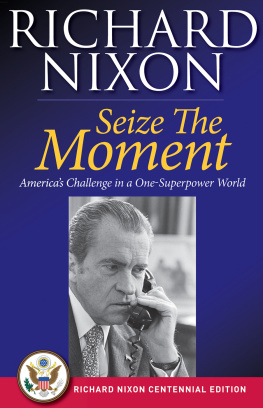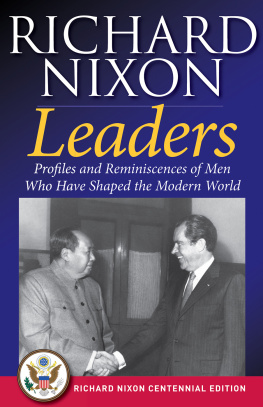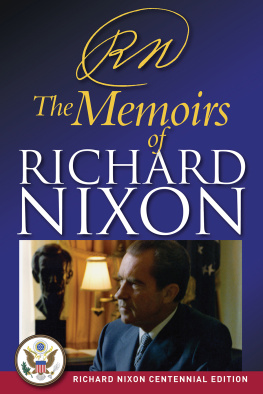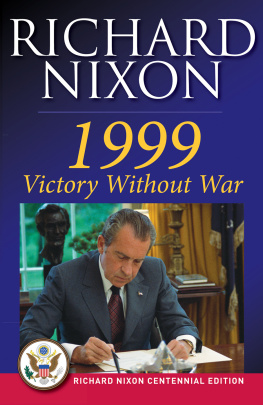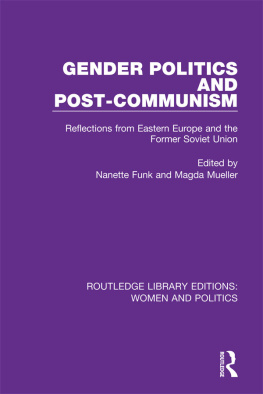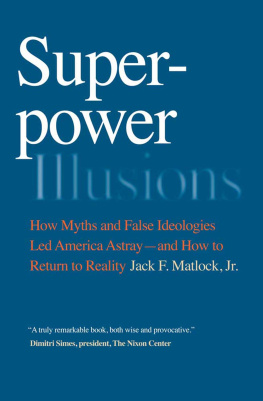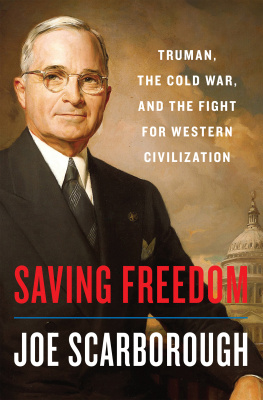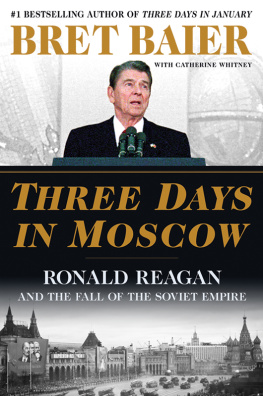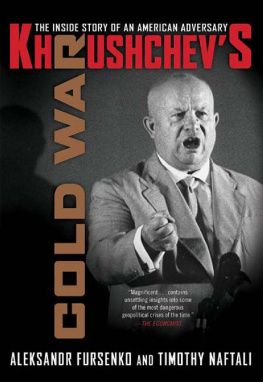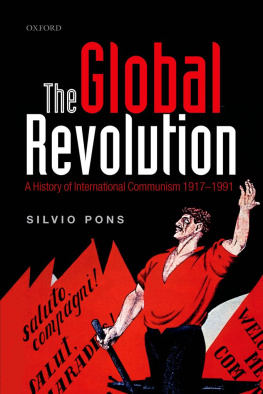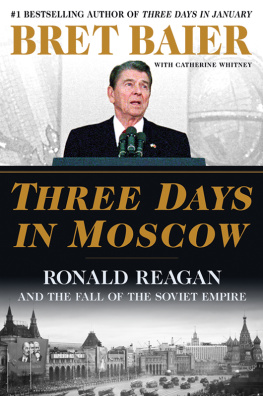We hope you enjoyed reading this Simon & Schuster eBook.
Join our mailing list and get updates on new releases, deals, bonus content and other great books from Simon & Schuster.
C LICK H ERE T O S IGN U P
or visit us online to sign up at
eBookNews.SimonandSchuster.com
Thank you for purchasing this Simon & Schuster eBook.
Join our mailing list and get updates on new releases, deals, bonus content and other great books from Simon & Schuster.
C LICK H ERE T O S IGN U P
or visit us online to sign up at
eBookNews.SimonandSchuster.com
Also by Richard Nixon
Beyond Peace
In the Arena
1999: Victory Without War
Real Peace
No More Vietnams
Leaders
The Real War
RN: The Memoirs of Richard Nixon
Six Crises

To the democrats
CONTENTS
1

THE REAL WORLD

I N TOASTING THE BEGINNING of a new relationship between China and the United States in the Great Hall of the People in Beijing twenty years ago, I quoted from a poem in which Mao Zedong exhorted his followers to work for the victory of communism: So many deeds cry out to be done always urgently. The world rolls on. Time passes. Seize the day. Seize the hour. Today, as we celebrate the defeat of communism in Eastern Europe and the Soviet Union and the defeat of aggression in the Persian Gulf, many deeds remain to be done abroad and at home. We must seize the moment to win victory for peace and freedom in the world.
For the past half century, we have lived in a world dominated by the clash of two superpowers inspired by two conflicting ideologies. The East-West struggle was the defining characteristic of the era. The Soviet Union and the United States confronted each other across the front lines in Europe and Asia, backed rival clients in regional conflicts in the Middle East and South Asia, and sparred with each other in civil wars throughout the underdeveloped world. But today one ideologycommunismhas been discredited beyond resurrection. And one superpowerthe Soviet Unionhas disintegrated, with the new noncommunist governments of its former republics so preoccupied with their massive problems at home that they can no longer play a major role abroad.
We now live in a world in which the United States is the only superpower. We must recast our foreign policy to cope with this radically new situation. For many on the American left and right, the knee-jerk response to the collapse of the Soviet Union as a credible superpower is to withdraw into a new isolationism. But in fact American world leadership will be indispensable in the coming decades.
During the last three years, the world took a roller-coaster ride from soaring hopes to shattered illusions to unbounded euphoria. In 1989, our expectations climbed as one great historic event was quickly overtaken by another. Communist regimes in Eastern Europe collapsed. The Berlin Wall fell. Soviet president Mikhail Gorbachev adopted significant political reforms. Superpower cooperation increased. Regional conflict in the underdeveloped world decreased. The conventional wisdom in the prestige media, in the universities, and in the think tanks was that we were witnessing the beginning of a new world order of peace and freedom.
In 1990, the changes of the previous year began to reverse themselves. The new democracies of Eastern Europe confronted the pains of reform. The Communist reactionaries in the Soviet Union caught their second wind. Gorbachev slammed the brakes on reform. Iraqi president Saddam Hussein invaded and pillaged Kuwait. America and its coalition partners were forced into a major ground war in the Persian Gulf. Regional conflicts in the underdeveloped world continued to defy easy resolution. The vision of a more peaceful world turned out to be a mirage. While the cold war had kept the peace between the two superpowers, its demise did not end the threat of hot war involving smaller powers.
In 1991, these developments were overtaken by two events. The decisive victory of the United States and its allies over Iraq and the expulsion of Saddam Husseins forces from Kuwait in February restored Americas confidence in its role as a world leader. This was eclipsed by one of the watershed events of the twentieth century: on August 24, the forces of freedom in the Soviet Union won victory without war over the forces of communism. Just as the Russian Revolution of 1917 raised the curtain on this centurys totalitarian horrors, the new Soviet revolution dropped the closing curtain on the final act of a failed ideology and totally discredited system of government. While Gorbachev was still a Communist, the ministers in the new government were noncommunists.
These starkly contrasting events should remind us that the real world revolves not around wishful thinking about peace breaking out all over but around the enduring realities of geopolitics. While we should celebrate the current turn of events, we should not give in to euphoria. In a world of competing states, clashing interests and national conflicts are inevitable. The skillful use of American power represents the best hope for advancing freedom and preserving peace. Only if we learn the right lessons from the dramatic developments of the last three years will we succeed in securing our interests and promoting our values.
For half a century, the principal cause of world conflict has been Communist aggression. The cold war started before World War II ended. Acting under cover of the infamous Hitler-Stalin Pact in 1939, Moscow annexed Lithuania, Latvia, Estonia, and large parts of prewar Poland and Romania. As the war ended, Stalin installed Communist puppet governments in Poland, Czechoslovakia, Hungary, East Germany, Bulgaria, and Romania. Soviet armies liberated Eastern Europe from Nazi Germany, but Communist liberation meant a new tyranny for these nations. To his subservient clients, Stalin exported the brutal tactics he had used in the Soviet Union before World War IIshow trials, political purges, forced-labor camps, and mass terror. As the iron curtain descended, Eastern Europe was enveloped in totalitarian darkness.
Eastern Europe was only the first theater of the cold war. Over the ensuing years, the Soviet Union annexed four Japanese islands in 1945, attempted to dismember Iran in 1946, sponsored Communist guerrillas in Greece and Turkey in the late 1940s, helped to establish a Communist regime in North Korea in 1948, tried to subjugate Josip Titos independent Communist regime in Yugoslavia in 1948, blockaded West Berlin in 1948, helped Mao Zedongs Communist revolution prevail in China in 1949, backed Communist North Koreas attack against South Korea in 1950, suppressed a workers uprising in East Germany in 1953, supported Beijing in two crises with the U.S.-supported Republic of China in Taiwan over Quemoy and Matsu in 1955 and 1958, triggered the Middle East arms race with sales to Egypt in 1955, slaughtered hundreds of Hungarian freedom fighters in the streets of Budapest in 1956, backed Gamal Abdel Nassers seizure of the Suez Canal in 1956, helped to establish Fidel Castros regime in Cuba in 1959, assisted Communist revolutionaries in the Congo in 1960, built the Berlin Wall in 1961, attempted to place offensive nuclear missiles in Cuba in 1962, supplied arms to India in wars against Pakistan in 1965 and 1971, supported Nassers adventurism throughout the Arab world in the late 1950s and 1960s, backed the Arab powers in their war against Israel in 1967, crushed the Czechoslovakian reform movement in the Prague Spring in 1968, supported Syria and radical Palestinians in their effort to topple the government of Jordan in 1970, provided indispensable assistance for North Vietnam in its war against South Vietnam, Laos, and Cambodia in the 1960s and 1970s, supplied and supported Syria and Egypts war against Israel in 1973, backed a Communist coup in Ethiopia in 1974, installed Communist regimes in Angola and Mozambique in 1975, helped the Communist Sandinistas take power in Nicaragua in 1979, supplied Communist guerrillas in El Salvador with arms since the late 1970s, invaded Afghanistan in 1979, backed the Communist governments repression of Solidarity and imposition of martial law in Poland in 1981, trained and supported scores of international terrorist groups, engaged in state-sponsored terrorism through its clients in East Germany, Bulgaria, and Afghanistan, and conspired in dozens of other attempted coups and revolutions in every corner of the world.
Next page
